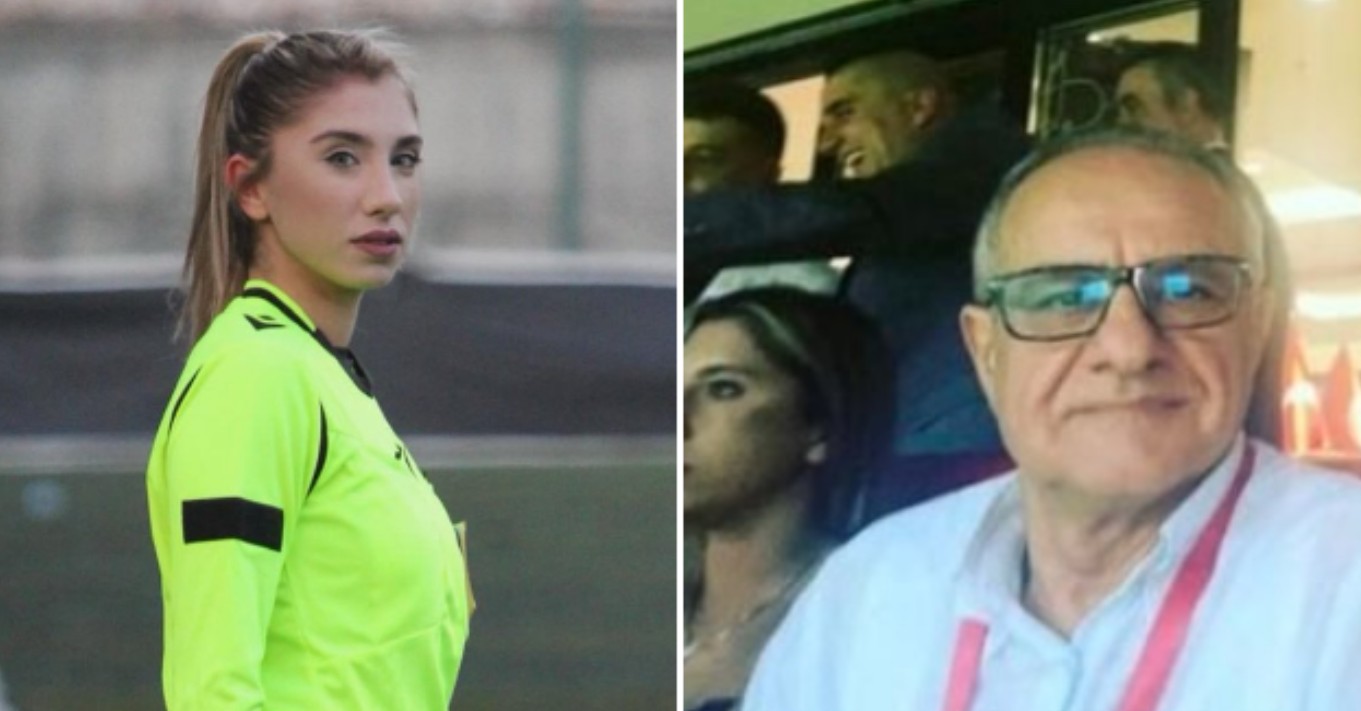Orhan Erdemir and Elif Karaarslan Video Incident
In recent months, Turkish football has been shaken by a controversy that has dominated both mainstream media and social networks. The scandal centered around two figures closely tied to the Turkish Football Federation (TFF): referee Elif Karaarslan and long-time federation observer Orhan Erdemir. When an video of the two surfaced online, the TFF swiftly revoked their professional licenses. This decision immediately sparked heated debates, dividing the sports community between those who applauded the Federation’s firm stance and those who criticized the intrusion into personal lives. The scandal not only impacted the individuals involved but also raised serious questions about privacy, ethics, and professionalism within Turkish football.
Contents
Background of the Incident and Video
The controversy first came to light when news broke that the TFF had revoked the licenses of both Orhan Erdemir and Elif Karaarslan. Shortly afterward, the reason became public, an video featuring the two had circulated online. In the age of social media, such content spreads rapidly, and within hours the video was widely shared and commented upon.
Uncensored video of Orhan Erdemir and Elif Karaarslan sparks intense controversies
orhan-erdemir-and-elif-karaarslan-video.mp4
The Federation’s decision was clear and immediate both figures would no longer be permitted to hold their professional roles. According to TFF officials, the decision was made to protect the integrity and reputation of Turkish football. However, the details of the incident remain murky, leaving room for speculation and fueling further media coverage. For the public, it became not only a sports story but also a sensational social issue.
Profile of Orhan Erdemir
At the center of the scandal was Orhan Erdemir, a 61-year-old observer for the TFF. Erdemir was well known within the football community, having worked in the sport for decades. As an observer, his role was to evaluate referees’ performances during matches, ensuring that officiating met professional standards.

Colleagues often described him as experienced and dedicated. His insights and evaluations were considered valuable by many within the Federation. Yet, with the surfacing of the video, his long career was abruptly derailed. The revocation of his license effectively marked the end of his official involvement in Turkish football.
For Erdemir, the scandal represented not only personal humiliation but also the loss of a professional identity that had defined much of his life. His fall from grace illustrates how quickly reputations can be undone in the modern media landscape.
Profile of Elif Karaarslan
The second figure at the heart of the scandal was Elif Karaarslan, a rising talent in the Turkish refereeing world. A graduate of Marmara University’s Faculty of Sports Sciences, Karaarslan had built her career as an assistant referee, officiating in numerous matches across Turkey.

Karaarslan stood out not only for her work on the pitch but also for her active engagement on social media. She frequently shared sports-related content with her followers, cultivating a fan base beyond the football community. Her posts highlighted her love for athletics, particularly her involvement in equestrian sports alongside football.
As one of the relatively few women working in Turkish refereeing, Karaarslan represented progress in a male-dominated field. However, her career trajectory was abruptly interrupted by the scandal. With her license revoked, her role in football was put on indefinite hold, leaving her future uncertain.
The Video and Its Consequences
The leaked video of Karaarslan and Erdemir was the catalyst for everything that followed. While details about how the video surfaced remain unclear, once it was online, it spread uncontrollably.

The TFF reacted swiftly, announcing the cancellation of both individuals’ licenses. Federation officials justified the decision by emphasizing the need to preserve professionalism and discipline within Turkish football. To them, the scandal represented not just a private matter but a public crisis that threatened the credibility of refereeing and officiating.
For many, the speed of TFF’s response was telling. Some argued that the Federation acted to protect its image above all else, seeking to end the controversy before it grew larger. Others saw it as an overreach into the private lives of its members, questioning whether personal relationships should have such profound professional consequences.
Public Reaction and Media Coverage
The scandal quickly became a trending topic on Turkish social media. Fans, journalists, and officials expressed polarized views. On one side, many supported the TFF’s actions, claiming that referees and observers hold positions of responsibility and should maintain professional conduct at all times. On the other side, critics questioned whether it was fair to punish individuals for what was essentially a private matter, even if it became public.
Traditional media outlets reported extensively on the story, often focusing on the sensational elements. Meanwhile, online forums and social platforms provided space for heated debates. The scandal was no longer just about two people it became a reflection of broader cultural questions in Turkish society, from gender roles in sports to expectations of morality for public figures.
Impact on Turkish Football
Beyond the individuals involved, the scandal had repercussions for the broader football community. Refereeing and officiating are already contentious topics in Turkish football, where accusations of bias or incompetence frequently spark controversy. The revelation that two officials were involved in a scandal further eroded public trust in the system.
The TFF now faces pressure to establish clearer rules and ethical guidelines regarding the private conduct of referees and observers. At the same time, the Federation must balance professionalism with respect for privacy an increasingly difficult task in a digital age where personal content can go public at any moment.
The case also raised questions about gender dynamics. As a female referee, Karaarslan’s involvement in the scandal attracted particular scrutiny, with some critics holding her to stricter moral standards than her male counterpart. This dynamic highlighted the persistent challenges faced by women in Turkish sports.
Career Implications for Both Individuals
For Orhan Erdemir, the scandal effectively ended his career. At 61, the loss of his license closed the door on any official role within the TFF. After decades of service, his reputation and legacy were overshadowed by a single controversy.
For Elif Karaarslan, the situation was more complex. As a younger professional with potential for growth, the revocation of her license cut short a promising career. The scandal transformed her social media presence from a source of admiration to a subject of scrutiny. Every post she made afterward was viewed through the lens of the controversy, illustrating how reputations can be reshaped almost overnight.
Broader Social and Ethical Questions
This case also forces a deeper reflection on ethics and privacy in sports. Should professional organizations have the authority to punish individuals for private behavior that does not directly affect their work? Where should the line be drawn between personal freedom and professional responsibility?
The scandal highlights the risks of the digital era. Personal content, once leaked, becomes nearly impossible to contain. For public figures, the stakes are even higher, as reputations can be irreparably damaged in hours.
In Turkey, the case also reflects cultural expectations. Public morality often intersects with professional roles, especially for women in high-visibility positions. The differing treatment and perception of Erdemir and Karaarslan underscore ongoing gender debates within society.
The scandal involving Elif Karaarslan and Orhan Erdemir was more than just a fleeting controversy. It represented a turning point in Turkish football, where issues of professionalism, privacy, and gender roles collided in a highly publicized way. The TFF’s swift decision to revoke both licenses demonstrated its commitment to protecting the sport’s image, but it also raised difficult questions about fairness and personal freedom.
For the individuals involved, the impact was profound. Erdemir’s long career ended abruptly, while Karaarslan’s rising trajectory was interrupted, leaving her future in uncertainty. For Turkish football, the incident underscored the fragile balance between maintaining credibility and respecting the private lives of its officials.
As the sports world continues to grapple with scandals amplified by social media, this case will likely remain a reference point in Turkey for years to come a reminder of how quickly personal missteps can escalate into professional crises, and how deeply they can shape the culture of the game.
Daily News -Baltasar Ebang Engonga Video and Controversy Scandal
Phillies Yankees Couple Fan Video and Debate Across Social
Mauro Icardi Ifsa Video and Scandal, Denial, Public Debate
Felix Baumgartner Death Video and The Fatal Crash
Otávio Jordão da Silva Video and Mob Justice
Justin D Mohn Video and National Alarm, Political Rant
Gabriela Lima Santana Video and Chilling Case


